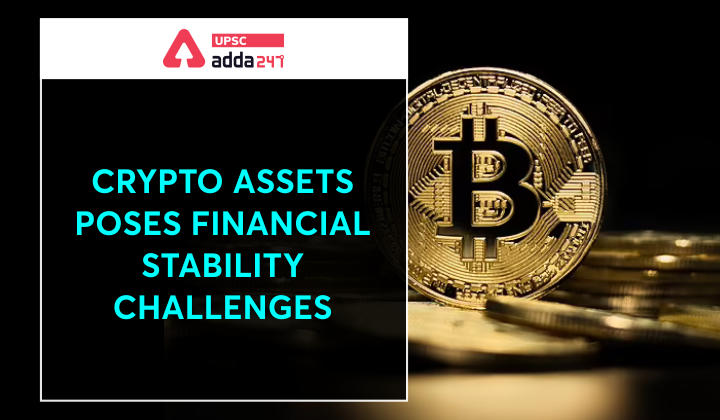Table of Contents
Relevance
- GS 3: Science and Technology- developments and their applications and effects in everyday life.
Context
- IMF in its latest Global Financial Stability Report has warned that the digital currencies, besides providing new opportunities, poses significant financial security challenges.
What are cryptocurrencies?
- A cryptocurrency (or “crypto”) is a digital currency that can be used to buy goods and services, but uses an online ledger with strong cryptography to secure online transactions.
- They operate independently of a central bank.
Benefits
- The rapid growth of the crypto ecosystem presents new opportunities.
- Technological innovation like cryptocurrencies is making payments and other financial services cheaper, faster, more accessible, and allows them to flow across borders swiftly.
- Crypto asset technologies have the potential as a tool for faster and cheaper cross-border payments.
- Bank deposits can be transformed to stable coins that allow instant access to a vast array of financial products from digital platforms and allow instant currency conversion.
- Decentralised finance like cryptocurrencies could become a platform for more innovative, inclusive, and transparent financial services.
Patents (Amendment) Rules, 2021
Challenges to financial stability
- Volatility: Bitcoin could lead to instability because it is extremely volatile. It was trading above 65,000 just about earlier this year, and then it came down to below 30,000.
- It is much more volatile than equities or commodities or even exchange rates.
- High transaction costs: Transaction costs can be fairly expensive and compared to digital money.
- For example: In India, we have RTGS (Real-Time Gross Settlement) payment system. It is slow because it’s a distributed ledger and to know about the status of any transaction, it has to be verified on many computers. So, it’s not that instantaneous, and it can be expensive to transact, besides being extremely volatile.
- Operational and financial integrity risks from crypto asset providers, investor protection risks for crypto-assets, and inadequate reserves and disclosure for some stable coins.
- Crypto assets can accelerate cryptoisation and circumvent exchange and capital control restrictions.
- Increased trading of crypto-assets in these economies could lead to destabilizing capital flows.
Steps needed
- Policymakers should implement global standards for crypto-assets and enhance their ability to monitor the crypto ecosystem by addressing data gaps.
- As the role of stable coins grows, regulations should correspond to the risks they pose and the economic functions they perform.
- Emerging markets faced with cryptoisation risks should strengthen macroeconomic policies and consider the benefits of issuing central bank digital currencies.




 TSPSC Group 1 Question Paper 2024, Downl...
TSPSC Group 1 Question Paper 2024, Downl...
 TSPSC Group 1 Answer key 2024 Out, Downl...
TSPSC Group 1 Answer key 2024 Out, Downl...
 UPSC Prelims 2024 Question Paper, Downlo...
UPSC Prelims 2024 Question Paper, Downlo...
